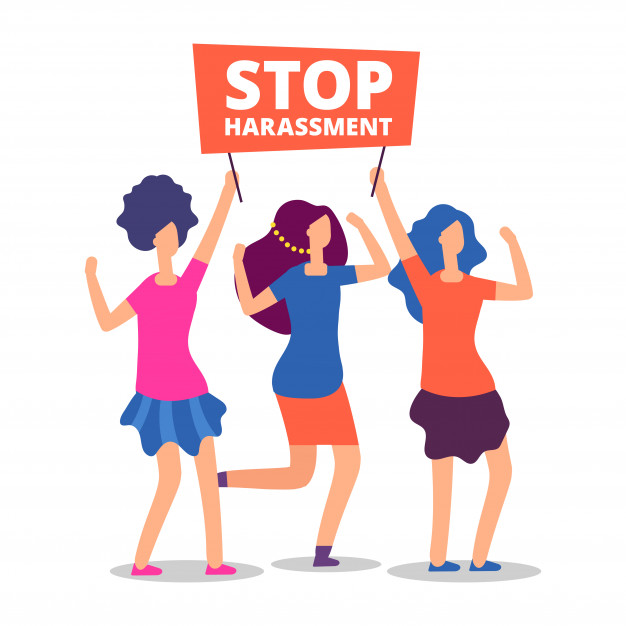UNDERSTANDING SEXUAL HARASSMENT IN THE WORKPLACE.
What is Sexual Harassment
A person who sexually harasses someone else is primarily responsible for their behaviour. Don't suffer alone. Call us now.
Our Hotline is Open 7 Days a Week
All calls are 100% confidential.
What is Sexual Harassment?
Sexual harassment, as defined under state specific anti-discrimination laws or falling under sex discrimination, is unwanted or unwelcome sexual advances, requests for sexual favours or conduct of a sexual nature in circumstances which a reasonable person, having regard to all the circumstances, would have anticipated this behaviour to cause offense, humiliation or intimidation.
A person who sexually harasses someone else is primarily responsible for their behaviour. However, in many cases, employers can also be held responsible for sexual harassment by their employees. This is called ‘vicarious liability’. Employers have a responsibility to take all reasonable steps to prevent sexual harassment in employment, such as implementing a sexual harassment policy and providing training or information on sexual harassment.
Sexual harassment is not sexual interaction, flirtation, attraction or friendship which is invited, mutual, consensual or reciprocated. However, if this consent is withdrawn or no longer invited and mutual, such as one employee wanted the relationship to end and the other party does not agree, this may constitute sexual harassment.
A single incident can constitute sexual harassment. This is different to the Commission’s jurisdiction to deal with bullying, which can only be accessed where the bullying behaviour is repeated. Whether a single incident will constitute sexual harassment depends on the ‘nature or quality of the action or statement’.


Covert Sexual Harassment?
Sexual harassment can also happen where a work environment or culture is sexually charged or ‘hostile’, even if the conduct is not directed at any particular employee. For example, workplaces, where sexist jokes and comments create and perpetuate a sexist organisational climate or sexist hostility. Although the comments may appear more covert and open for interpretation, they still negatively affect occupational wellbeing.
The rejection of a sexual advance or request for sexual favour results in a tangible employment detriment, a loss of a job benefit such as employment, promotion, salary increases, shift or additional work, performance expectations and other conditions of employment. It is often that this type of detriment is caused by an employer, supervisor or agent of the employer who has the authority to make decisions about employment and so employees feel trapped. Before things escalate to this point, it is important to note that sometimes employees’ may be groomed. For instance, your boss or supervisor may start by placing a hand innocently on your shoulder, waiting for your reaction. If you’re a new employee, you might feel scared to complain about this as this person is in a position of power.
Nevertheless, if an employee is uncomfortable by conduct of other employees or their superiors, they have the right to speak up and put an end to sexual harassment of all forms.
Workplace relationships
Relationships in the workplace
What about consensual relationships in the workplace? Can an employer prohibit workplace relationships? When will a workplace relationship constitute sexual harassment? Can an employer breach sexual harassment laws by allowing workplace relationships? These are common questions and concerns both employees and employers have in regards to sexual relationships in the workplace.
As demonstrated through statute and case law, employers’ can only require employees to comply with “lawful and reasonable” directions. Hence, an employer cannot technically prohibit employees having a relationship as it may constitute an unjustifiable incursion into the private lives of those employees. There are however exceptions such as when the relationship between the employees deteriorates.
What happens when one employee wants the relationship to end and says “no”?
In this example, an employer may reserve the right to prohibit a workplace relationship when it becomes evident that both parties are no longer consenting to the relationship. If one employee wishes for the relationship to end and the other party does not agree, this may constitute sexual harassment which would involve the employee. Aforementioned, employers have a responsibility to take all reasonable steps in preventing sexual harassment. Thus, an employer may reserve the right to get involved in workplace relationships when it breaks down and affects the employees in their employment.
Can an Employer impose on the relationship?
An employer may impose an obligation on employees to disclose any workplace relationships, although private, where there is an actual or potential conflict of interest. For instance, where a relationship eventuates between employees and one of them is in a position of power or influence over the other. Disclosure in this example would be vital for an employer to manage this conflict. In these cases, an employer may reserve the right to transfer one of the employees into a different role or sector of the Company. However, these measures and changes need to be specifically targeted at managing the issue of the conflict of interest. It is important to note that in these situations, both parties must be treated equally when deciding what measures will be put into place to minimise conflicts of interest. For instance, previous sexual harassment claims have indicated that it is frequently the female who is moved into a different sector of the Company and so employers must treat both parties as equals. They must look at the individuals roles’ and their suitability for different Company sectors, when assessing who is required to relocate.



Employers Liability
Federal and state legislation make employers liable for sexual harassment on behalf of their employees, unless they have taken all reasonable steps to prevent sexual harassment taking place. In order to prevent sexual harassment, an employer should have a sexual harassment policy, implement it and monitor its effectiveness. An employer should also conduct training, modules or seminars on sexual harassment in order to educate employees’ on the policies and procedures. All Company management and staff should be trained and aware of their rights and responsibilities. On induction, the Company should make new employees aware of the Company policies and complaints procedures.
The Company should have strict internal complaint procedure to help resolve complaints of sexual harassment promptly, fairly and effectively. Even after a complaint is considered “resolved”, employees must continue to monitor the situation and prevent the conduct from occurring again. In addition, Companies should review their policies and procedures on a regular basis, particularly after receiving a complaint.
If sexual harassment does unfortunately occur, then the employer must take appropriate remedial action in response and resolve the incident. An employer should have appropriate procedures for dealing with grievances and complaints once they are made. A thorough investigation should be undertaken where employees, witnesses and the accused are interviewed. This investigation should be clearly documented in order for all employees to feel that the Company has done everything in their power to rectify the situation.
What can I do if I feel I am being sexually harassed?
If an employee feels as though they are being sexually harassed or they witness sexual harassment or sexual culture in the workplace, the first step is reporting and complaining about this conduct to the Company’s management. Reporting and complaining about this behaviour through the Company’s internal channels is the safest first step. This allows the Company to rectify and take action in order to stop the harassment.
If an employee feels as though the Company has not effectively dealt with their complaint, the employee can take the matter externally. External bodies include the Fair Work Commission, anti-discrimination boards, civil and administrative tribunals and commissions.

Remedies
If an employer can successfully prove that an employer is liable for sexual harassment on behalf of their employees and they have not taken all reasonable steps to prevent sexual harassment taking place or appropriate steps to rectify and deal with the harassment, the employee is entitled to remedies.
Remedies available vary in the different jurisdictions but can include financial and non-financial loss. In regards to financial loss, the employee may be granted orders relating to continuity or lost remuneration as a result of the sexual harassment.
In regards to non-economic loss, an employee may be entitled to compensation for hurt, humiliation and distress where there is a casual connection between the employers’ liability and the loss suffered by the employee. Compensation in this form is referred to as general damages. An employee may also request a formal apology or force the Company to review sexual harassment policies and procedures in place as well as conduct training and information sessions on these policies and procedures.

